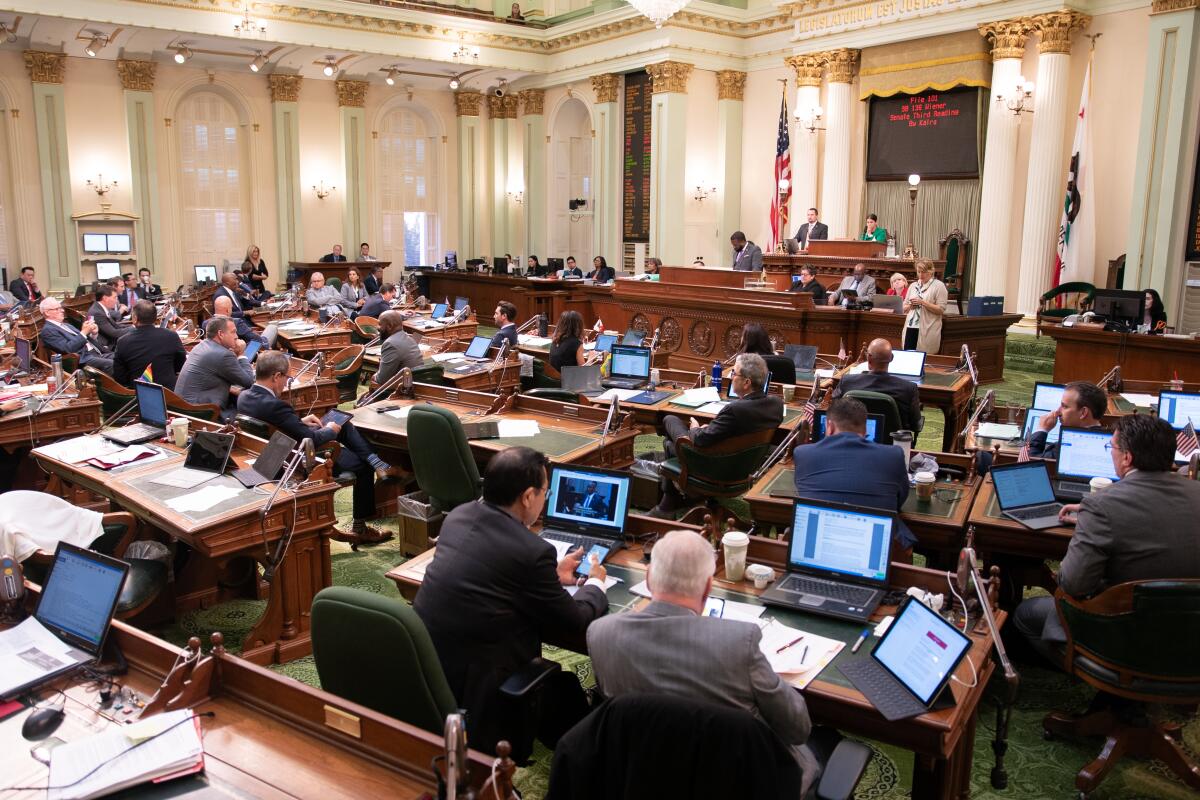California bills target doctors, websites pushing vaccine misinformation

SACRAMENTO â California lawmakers are targeting doctors and websites that promote COVID-19 misinformation in the latest batch of bills introduced by a group of Democrats pushing for stronger vaccination laws in the state.
Assembly Bill 2098 by Assembly Member Evan Low (D-Campbell) would make it easier for the Medical Board of California to discipline doctors who promote COVID-19 misinformation by classifying it as unprofessional conduct. Low said the bill will make it clear that lawmakers want the stateâs troubled medical board to go after doctors who peddle inaccurate information about the coronavirus.
Lawmakers have expressed frustration with the medical boardâs slow complaint-driven process, which has allowed a handful of doctors in the state to promote conspiracy theories and unproven treatments throughout the pandemic.
âThe spreading of misinformation â of inaccurate COVID-19 information â contradicts the responsibility [of doctors] and threatens to further erode the public trust in the medical profession and puts all patients at risk,â Low said Tuesday.
Nick Sawyer, an emergency room doctor who created a group called No License for Disinformation, said the bill would affect a small group of doctors who spread blatantly inaccurate and extreme misinformation that a physician knows to be false, or that they should know to be false given their medical training. Sawyer said he believes the stateâs medical board is authorized to go after those doctors now, but that the bill is needed because the agency has been slow to react.
âThis isnât a call for a policing of free speech,â Sawyer said. âThis is a call for protecting the public against dangerous misinformation, which patients are parroting back to us in our emergency room departments every day.â
The California Medical Assn., a lobbying group representing doctors, has not taken a position on the bill but has previously supported legislation cracking down on doctors who undermine vaccine laws.
âHealthcare professionals are working around the clock to end the deadly pandemic, and misinformation has only prolonged it, making the work of our frontline healthcare workers more difficult and dangerous while harming community health,â Dr. Robert E. Wailes, the associationâs president, said in a statement Tuesday.
Senate Bill 1018 by Sen. Richard Pan (D-Sacramento) would require online platforms such as Facebook to publicly disclose how their algorithms work and to share data for research purposes in order to shed more light on how misinformation spreads. The bill is modeled after federal legislation that would require social media platforms to publicly disclose their corporate policies, key metrics and data for combating online hate, disinformation, extremism, harassment and foreign interference.
âIdeally, we would have a national solution to this. However, we cannot wait,â Pan said. âTransparency allows the public to make informed decisions, and lawmakers and researchers need necessary information so we can hold online platforms accountable and also set standards.â
Nathaniel Persily, director of the Cyber Policy Center at Stanford University, said Panâs bill would help balance the âinformation ecosystemâ currently controlled by a handful of companies.
âThe bottom line here is that we cannot live in a world where Facebook and Google know everything about us and we know nothing about them,â Persily said. âThese large information monopolies really have lost the right to secrecy.â
Both bills were introduced Monday, but many of the details outlining how they would regulate online platforms and strengthen disciplinary actions against doctors who spread misinformation are not yet laid out in the legislation.
The bills were introduced as part of a larger effort by a group of Democratic legislators who have been working this year to strengthen vaccination laws. The legislation has set off a contentious debate over how far the state should go to push unvaccinated residents to be inoculated against COVID-19.
Assembly Bill 1993 by Assembly Member Buffy Wicks (D-Oakland) would require employees and independent contractors to be vaccinated against COVID-19 as a condition of employment, unless they have an exemption based on a medical condition, disability or religious beliefs.
Assembly Bill 1797 by Assembly Member Akilah Weber (D-San Diego) would allow California school officials to more easily check student vaccine records by expanding access to a statewide immunization database. Senate Bill 866 by Sen. Scott Wiener (D-San Francisco) would allow children 12 and older to be vaccinated without parental consent. And Senate Bill 871 by Pan would require the COVID-19 vaccine for all schoolchildren in the state.
More to Read
Sign up for Essential California
The most important California stories and recommendations in your inbox every morning.
You may occasionally receive promotional content from the Los Angeles Times.







![[20060326 (LA/A20) -- STATING THE CASE: Marchers organized by unions, religious organizations and immigrants rights groups carry signs and chant in downtown L.A. "People are really upset that all the work they do, everything that they give to this nation, is ignored," said Angelica Salas of the Coalition of Humane Immigrant Rights. -- PHOTOGRAPHER: Photographs by Gina Ferazzi The Los Angeles Times] *** [Ferazzi, Gina -- - 109170.ME.0325.rights.12.GMF- Gina Ferazzi/Los Angeles Times - Thousands of protesters march to city hall in downtown Los Angeles Saturday, March 25, 2006. They are protesting against House-passed HR 4437, an anti-immigration bill that opponents say will criminalize millions of immigrant families and anyone who comes into contact with them.]](https://ca-times.brightspotcdn.com/dims4/default/34f403d/2147483647/strip/true/crop/1983x1322+109+0/resize/840x560!/quality/75/?url=https%3A%2F%2Fcalifornia-times-brightspot.s3.amazonaws.com%2Fzbk%2Fdamlat_images%2FLA%2FLA_PHOTO_ARCHIVE%2FSDOCS%2854%29%2Fkx3lslnc.JPG)



